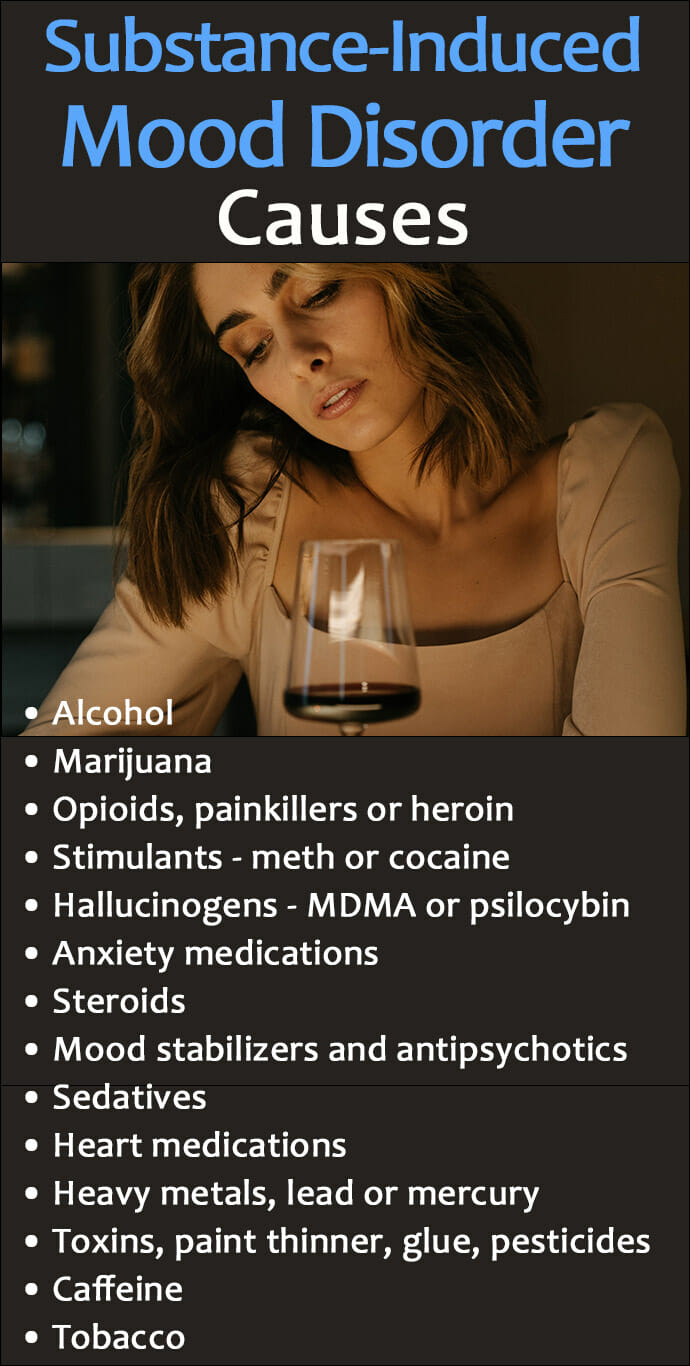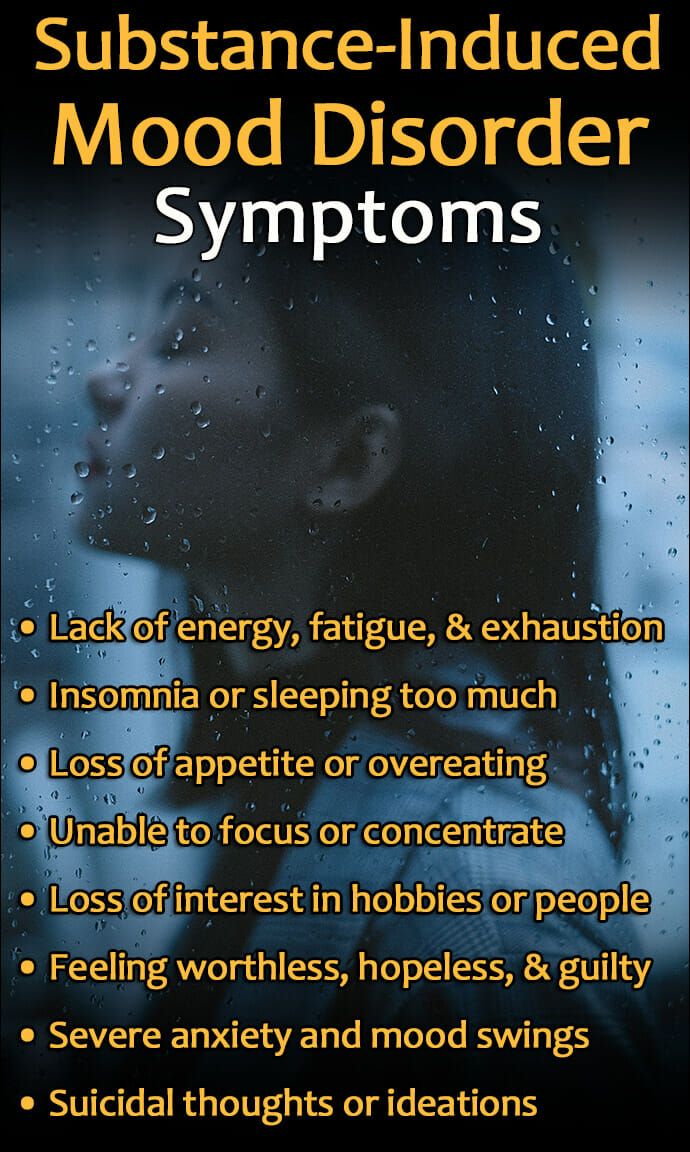A substance-induced mood disorder can occur during or after using certain substances like alcohol or opioids. Sometimes referred to as a substance-induced mental disorder, it can cause symptoms of depression or anxiety, and is not limited only to illegal or recreational drugs.
Most people understand that life comes with emotional ups and downs, and that the everyday challenges can lead to periods of stress, anxiety, and depression.
These bouts of sadness and worry usually tend to be temporary for most of us. In some cases, these episodes can last longer than expected and may actually be the result of a substance-induced mood disorder.
This condition can be a significant, persistent emotional disturbance from the effects of a particular medication, drugs of abuse like alcohol, marijuana, or opioids, or and even exposure to certain heavy metals, according to the American Psychological Association (APA).
What Causes a Substance-Induced Mood Disorder?
A substance-induced mood disorder can be common among people with substance use disorders.
Research data suggests that among people with an alcohol use disorder, 40 to 60 percent battle episodes of a substance induced depressive disorder. The statistics among those who struggle with opioid abuse are similar.
Most experts believe that certain substances change or interfere with chemical messengers in the brain, which then leads to the substance-induced mental disorder.
Misusing or abusing drugs, whether they are legal, illegal, or even prescribed, can increase the risk of this disorder because the psychological outcomes of intoxication and withdrawal are likely to lead to serious mood disturbances.
Substances Known to Cause a Substance Induced Mood Disorder
There are four different categories of substances known to cause substance-induced mood disorders. These include the following:
1. Medications and substances that cause stimulation or intoxication
Legal medications, in addition to legal or illicit substances that cause some form of stimulation or intoxication, can include the following:
- Alcohol and marijuana
- Hallucinogens, such as LSD, psilocybin mushrooms, and MDMA
- Stimulants like methamphetamine and cocaine
- Opioids, including prescription painkillers or heroin
- Caffeine and tobacco
2. Prescription medications used to treat certain medical conditions
Prescription medications can sometimes cause adverse reactions, especially when mixed with other substances.
- Anxiety medications
- Steroids
- Heart medications for hypertension and other issues
- Psychotropic meds, such as mood stabilizers and antipsychotics
- Sedatives
3. Exposure to heavy metals
Exposure to certain types of heavy metals can lead to a substance-induced mood disorders. Those listed here can be especially problematic.
- Arsenic
- Mercury or chromium
- Cadmium
- Lead
4. Exposure to toxins
Many of the toxins listed below are routinely found around the home or some work environments and are usually not harmful when used properly, but can cause problems with over-exposure.
- Paint or paint thinners
- Some forms of glue and certain types of adhesives
- Gasoline
- Pesticides
Substance-Induced Mood Disorder Symptoms
One of the reasons substance-induced mood disorders may go undiagnosed is that the symptoms are similar to other mental health conditions, such as depression, anxiety, obsessive-compulsive disorder and bipolar disorder.
Symptoms of a substance-induced mood disorder can include some of the following:
- Lack of energy, constant fatigue, and unexplained exhaustion
- Sleep issues, such as insomnia or sleeping too much
- Changes in eating habits exhibited by loss of appetite or overeating
- An inability to focus or concentrate
- Loss of interest in activities, hobbies, or people once cherished
- Feelings of worthlessness, hopelessness, and guilt
- Severe anxiety and mood swings
- Suicidal thoughts or ideations
People struggling with a substance use disorder are not always open with their health care providers about misusing or abusing drugs and alcohol.
For this reason, a substance-induced mood disorder may go undiagnosed and untreated, creating significant life problems for those battling the disorder.
Diagnosing a Substance-Induced Mood Disorder
In some cases, blood or urine lab tests may detect exposure to substances that can lead to mood disorders. However, being open and honest with your physician about alcohol and drug use is extremely important for properly diagnosing the condition.
It’s necessary to determine if the mood disorder or mental health condition existed before the use or exposure of the substances that may be causing a problem.
Once doctors are aware that a mood disorder may be the result of misuse, abuse, or exposure to certain substances, they will need to evaluate whether the symptoms cause significant disruption in a person’s ability to function.
Health care providers will also look at when the symptoms first developed, whether they are related to withdrawal from a substance, or exposure to any current medication use, drugs, toxins, or heavy metals.
Additionally, physicians will want to see if simply stopping certain medications or having a patient give up alcohol and drugs will reduce or cease a person’s symptoms before moving into further treatment of a substance-induced mood disorder.
Substance-Induced Mood Disorder Treatment
In many cases, eliminating exposure to some toxins, changing suspected medications, or giving up alcohol and drugs can help a person recover.
In very serious cases of substance-induced mental disorders, patients might require inpatient detox treatment for medical monitoring and care during withdrawal when giving up addictive substances.
Some types of prescribed medications for mood disorders like benzos for anxiety, can actually cause a substance-induced mood disorder for the condition they are intended to treat.
In this instance, it is not safe to abruptly quit using benzos all at once so they need to be tapered and may require specialized benzodiazepine withdrawal treatment to avoid unhealthy or dangerous side effects.
For some types of substance-induced mental disorders, antidepressant medications may be prescribed to help ease the symptoms after a person stops taking the causative medication or moves to a different drug.
It may be helpful for people whose substance-induced mood disorder is caused by a substance use disorder related to drug or alcohol addiction to undergo dual diagnosis treatment to address both the addiction and mental health condition.
Treatment for a substance use disorder will usually involve one-on-one and group therapy that will address the underlying causes of addictive behavior as well as treat any diagnosed mood disorders.
Other treatment approaches like cognitive behavioral therapy can be incredibly powerful tools for helping people recover from addiction and mood disorders to make a full recovery.
To successfully recover from a substance-induced mood disorder, it’s necessary to first get an accurate diagnosis of the condition to identify the most appropriate method of treatment.






